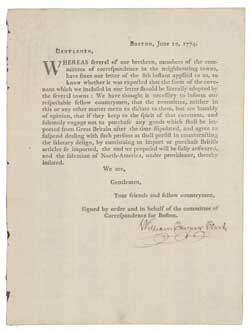“For every inhabitant in each town to sign”
Among the Bostonians objecting to the town committee of correspondence’s Solemn League and Covenant of June 1774 was John Andrews. Normally a supporter of the Whigs, that merchant wrote on 12 June:
The complaint that the committee had acted “without consulting ye. town” isn’t entirely fair. A vote in the town meeting had ordered the committee to send a non-consumption agreement to other towns. Another vote scheduled the next meeting session more than two weeks away with no indication that the committee should hold their work until then. But clearly Andrews wished he (or like-minded colleagues) had had a chance to review the details.
There may also have been pushback from the other Massachusetts towns who received the printed letter from Boston, accompanied by a printed pledge with blanks to fill in. On 10 June, only two days after sending out his first letter, town clerk William Cooper sent a follow-up, also printed:
TOMORROW: Conflicting texts.
Our committee of correspondence, not content with the calamities already come upon us, have issued out letters to every town in the province (without consulting ye. town in regard to the expediency of such a measure) accompanied with a Solemn League and covenant, so stil’d, for every inhabitant in each town to sign, whereby they obligate themselves by the most sacred oaths not to purchase any kind of goods fabricated in England, either already here, or that may be hereafter imported.Andrews hadn’t seen the text of the Solemn League and Covenant as of 12 June, but obviously he didn’t like what he’d heard about it.
Such is the cursed zeal that now prevails: animosities run higher than ever, each party charging the other as bringing ruin upon their country; that unless some expediency is adopted to get the Port open by paying for the tea (which seems to be the only one) am afraid we shall experience the worst of evils, a civil war, which God avert! . . .
those who have govern’d the town for years past and were in a great measure the authors of all our evils, by their injudicious conduct—are grown more obstinate than ever, and seem determin’d to bring total destruction upon us: which may be sufficiently evinced by all their conduct. They not only intend to deprive us of trade in future, but render us utterly incapable of contributing that assistance which will be absolutely necessary for the support of the indigent the approaching fall and winter, by their cruel endeavors to stop the little inland trade we expected.
The complaint that the committee had acted “without consulting ye. town” isn’t entirely fair. A vote in the town meeting had ordered the committee to send a non-consumption agreement to other towns. Another vote scheduled the next meeting session more than two weeks away with no indication that the committee should hold their work until then. But clearly Andrews wished he (or like-minded colleagues) had had a chance to review the details.
There may also have been pushback from the other Massachusetts towns who received the printed letter from Boston, accompanied by a printed pledge with blanks to fill in. On 10 June, only two days after sending out his first letter, town clerk William Cooper sent a follow-up, also printed:
Whereas several of our brethren, members of the committees of correspondence in the neighbouring towns, have since our letter of the 8th instant applied to us, to know whether it was expected that the form of the covenant which we inclosed in our letter should be literally adopted by the several towns:That suggests other towns’ selectmen or committees resented something about the Boston documents. Did the problem lie in the parameters of the boycott, the language, or the speed of the campaign? Or simply in Boston appearing to issue forms for smaller towns to fill out?After all, this was a crusade for local self-government.
We have thought it necessary to inform our respectable fellow countrymen, that the committee, neither in this or any other matter mean to dictate to them, but are humbly of opinion, that if they keep to the spirit of that covenant, and solemnly engage not to purchase any goods which shall be imported from Great Britain after the time stipulated, and agree to suspend dealing with such persons as shall persist in counteracting the salutary design, by continuing to import or purchase British articles so imported, the end we proposed will be fully answered, and the salvation of North-America, under providence, thereby insured.
TOMORROW: Conflicting texts.


No comments:
Post a Comment